
Wolf Creek Pass, The Old Home Filler-up an' Keep on a-Truckin' Cafe is the debut album by country musician C. W. McCall, released in 1975 on MGM Records. It was recorded after the success of a song included in the album, "Old Home Filler-up an' Keep on a-Truckin' Cafe", which was used in a popular television commercial that helped make McCall famous. McCall in the commercials was portrayed by a silent Jim Finlayson, with a first-person voiceover by Bill Fries; Fries, who had co-created the character with future Mannheim Steamroller founder Chip Davis, took over as the face and voice of the character with the album's release, taking on the stage name "C. W. McCall" for the rest of his life. The album concentrated predominantly on themes related to trucking, with many of them based on events in Fries' life. The album also contained the eponymous song "Wolf Creek Pass", which helped popularize the actual mountain pass itself. The actual "Old Home Filler-up an' Keep on a-Truckin' Cafe" was located in Pisgah, Iowa.

Black Bear Road is an album by country musician C. W. McCall, released on MGM Records in 1975. It is largely considered the album which gave him the most significant boost of his career, almost entirely due to the hit novelty song, "Convoy", that hit the number one spot on both Billboard's Country charts and its Pop charts. The song itself was largely responsible for starting a nationwide citizens' band radio craze. The song "Black Bear Road" in turn popularized the now-infamous road itself, along with its "You don't HAVE to be crazy to drive this road - but it helps" sign.
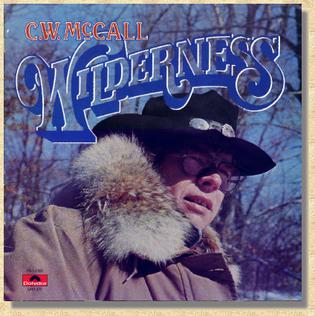
Wilderness is an album by country musician C. W. McCall, a pseudonym of singer and advertising executive Bill Fries, released on Polydor Records in 1976. As its title suggests, it focuses on subjects connected with nature, the environment and humans' impact on them. "There Won't Be No Country Music ", for example, is a statement on the environment's bleak-looking future and the effects of over-commercialization bordering on propaganda. "Crispy Critters", on the other hand, is the humorous telling of a true tale involving a group of hippies riding into a town and being forced away and threatened by the mayor.
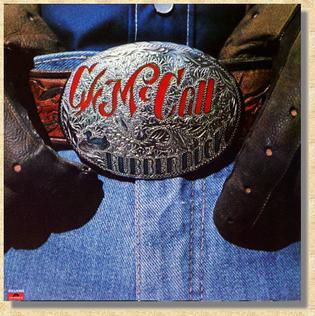
Rubber Duck is an album by country musician C. W. McCall, released on Polydor Records in 1976. It is his fourth album, released the same year as Wilderness, but concentrating on the themes the McCall character was popular for – trucking, as opposed to the various depictions of nature that could be found in Wilderness. Among others, the album contains the song "'Round the World with the Rubber Duck", a sequel to McCall's earlier wildly popular hit "Convoy", with many humorous and absurd elements added. "Audubon" is a quasi-autobiographical song, while "Ratchetjaw" is a take on trucker slang, with a multitude of CB-related terminology included in the lyrics.

The Real McCall: An American Storyteller is an album by country musician C. W. McCall, released on American Gramaphone in 1990 and rereleased in 1999. It features revamped digital versions of some of McCall's better known songs, including "Convoy", "Wolf Creek Pass" and "Black Bear Road", rerecorded by the artist for the album. It contains more songs than any other release by the artist, with sixteen tracks in total. It features songs from most of McCall's albums, the exceptions being his later works, C. W. McCall & Co. and Roses for Mama. One new track, "Comin' Back for More", telling the story of the infamous American cannibal Alferd Packer, was recorded for the album and serves as its opener. Songwriting on the album is credited to lyricist Bill Fries and composer Chip Davis, who together have created nearly all original songs by McCall throughout the history of the character.

American Spirit is an album released on American Gramaphone in 2003 as a collaboration between Mannheim Steamroller and country musician C. W. McCall. The album focuses on American patriotic songs, hence the title. McCall contributed to a number of spoken word songs on the album and rerecorded his 1976 hit song "Convoy" for it; this was also the case with another song of his, "Wolf Creek Pass," which can be found on the album. McCall is a persona created by Bill Fries and Manheim Steamroller leader Chip Davis; Fries provides the vocals as McCall. This was the last album to feature C. W. McCall.
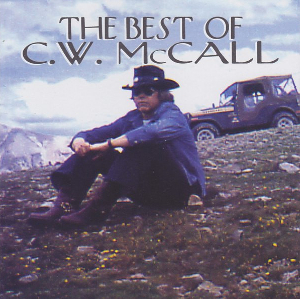
The Best of C. W. McCall is a greatest hits album released by country musician C. W. McCall on the PSM label in 1997. As with all "best of" releases from McCall, the album contains the wildly popular song "Convoy", as well as eleven others. The cover is almost identical to that of McCall's second album, Black Bear Road.

The Legendary C. W. McCall is a greatest hits album released on audio cassette only by country musician C. W. McCall in 1991, on the PolyGram label. It does not contain any songs that cannot be found on the most well-known "best of" releases from McCall, The Best of C. W. McCall and C. W. McCall's Greatest Hits. Several errors were made in the track listing; for instance, "Black Bear Road" was listed as "Black Beer Road", while "Crispy Critters" was given the title "Crispy Critter".

Four Wheel Cowboy is a greatest hits album by country musician C. W. McCall, released in 1989 on Polydor Records. All of the songs found on it, as well as three more, can be found on a later "best of" album, The Best of C. W. McCall. The release itself takes its name from a McCall song by the same name, which is featured on the album.

Two Sides of the Moon is the only solo studio album by the English rock musician Keith Moon, drummer for the Who. It peaked at No. 155 on the Billboard 200. The album title was credited to Ringo Starr. Rather than using the album as a chance to showcase his drumming skill, Moon sang lead vocals on all tracks, and played drums only on three of the tracks, although he played percussion on "Don't Worry Baby". The album features contributions from Ringo Starr, Harry Nilsson, Joe Walsh of the Eagles, Jim Keltner, Bobby Keys, Klaus Voormann, John Sebastian, Flo & Eddie, Spencer Davis, Dick Dale, Suzi Quatro's sister Patti Quatro, Patti's bandmates from Fanny Jean Millington and Nickey Barclay, and future actor Miguel Ferrer.

It Don't Get Any Better Than This is an album by American country music singer George Jones released on April 7, 1998, on the MCA Nashville label.
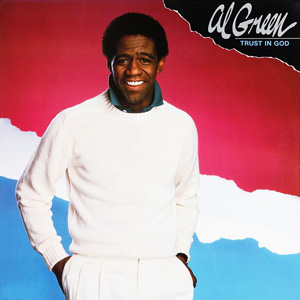
Trust in God is a studio album by soul singer Al Green, released in 1984. It is a collection of cover songs, performed in the style of gospel music.
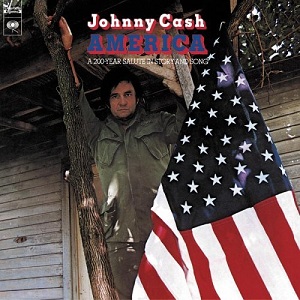
America: A 200-Year Salute in Story and Song is a concept album and the 40th overall album by country singer Johnny Cash, released on Columbia Records in 1972. As its title suggests, it comprises a number of tracks dedicated to the topic of American history, like several of Cash's other Americana albums. The record is a mix of songs and narration, in which Cash attempts to describe elements of the country's past, including famous personalities like Paul Revere or Big Foot. America also includes a re-recording of "Mr. Garfield" and "The Road to Kaintuck", songs previously released as singles in 1965 on Sings the Ballads of the True West. Most of the tracks on the album were written by Cash, with some exceptions, including a rendition of the well-known song "The Battle of New Orleans" and a reading of Abraham Lincoln's famous Gettysburg Address. The album was included on the Bear Family box set Come Along and Ride This Train.

C. W. McCall & Co. is country musician C. W. McCall's sixth and last album of original songs, released on Polydor Records in 1979, before McCall announced his retirement from the music industry. Out of the ten tracks, only one was written as a collaboration between McCall and Chip Davis, Fries's songwriting partner, while one other, "Silver Cloud Breakdown", was composed by Davis several years earlier and was featured in the movie Convoy, though it was not present on its soundtrack.

How About Now is the thirteenth studio album by American singer-songwriter Kenny Loggins. Released in 2007, its key tracks include "A Love Song" and the title track, "How About Now." To date, it was his most recent album composed of entirely original material.

Grasshopper is a 1982 album by J. J. Cale. It was his seventh studio album since his debut in 1971.

Little Texas is the fourth studio album released in 1997 by the country music group Little Texas. It was their last album for Warner Bros. Records. "Bad for Us", "Your Mama Won't Let Me" and "The Call" were all released from this album, peaking at numbers 45, 64 and 71, respectively, on the Billboard country charts, making this the first album of Little Texas' career not to produce any Top 40 country hits.

The Tractors is the debut studio album by American country music band The Tractors. Released in August 1994 on Arista Records, it set a record for becoming the fastest-selling debut album by a group to achieve Recording Industry Association of America platinum certification in the United States; by the end of the year, it was certified double platinum, and became the highest-selling country album of 1994. The tracks "Baby Likes to Rock It", "Tryin' to Get to New Orleans", and "Badly Bent" were all released as singles. "Baby Likes to Rock It" was the only one to reach the top 40, peaking at number 11 on Hot Country Songs.

Shades is the sixth studio album by J. J. Cale, released in February 1981.

The Woodstock Experience is a box consisting of a set of studio albums and live performances from the 1969 Woodstock Festival by the artists Santana, Janis Joplin, Sly and the Family Stone, Jefferson Airplane, and Johnny Winter. Each set consists of the 1969 studio album by the artist as well as each artist's entire Woodstock performance. The set was released as both a box containing all five artists, and also as individual releases separated by artist, each containing the studio album and live performance of that artist.




















